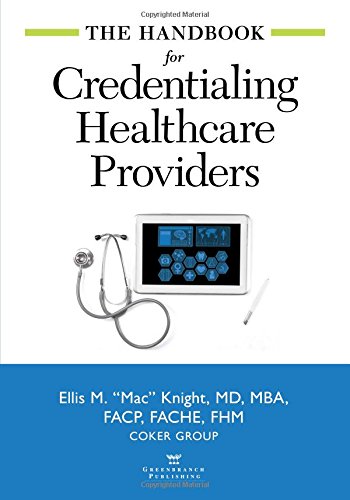
Read The Handbook for Credentialing Healthcare Providers book online now. You also can download other books, magazine and also comics. Get online The Handbook for Credentialing Healthcare Providers today. Are you Looking Download or read The Handbook for Credentialing Healthcare Providers for free..? enjoy it.
This handbook enables your organization to systemize the tedious, ongoing, and mandatory process of credentialing your medical staff and to understand why you must! Healthcare organizations lose substantial revenue when providers on their medical staff are not properly credentialed. Payers have unique requirements for providers to satisfy before they will pay for services. Hospitals often face difficulty in getting the information from the provider and are challenged by a lack of systems for initial and ongoing verification and documentation. Administrators must weigh the cost benefits of in-house or outsourced credentialing and evaluate the options for software and other tools. Readers who use this handbook will feel confident and secure in their knowledge. Expanded description for online store: Healthcare organizations must have credentialed medical staffs to deliver their services. The reasons are two-fold: First, educated, licensed, experienced, and proven caregivers ensure that a hospital or medical practice is capable of delivering quality care. Secondly, payers require that the physicians and other licensed healthcare professionals are qualified and licensed to work with their patients. Before receiving payment for services, the provider must have specific credentials for providing that service. Verifying and documenting the credentials of a healthcare provider is tedious, ongoing, and mandatory. An organization with a large medical staff may struggle with keeping the credentialing function current, as many licenses have rolling expirations. Credentialing ensures that clinical practitioners are duly qualified, licensed, and board certified. It reports the history of malpractice claims, state-instituted sanctions, or other undesirable professional circumstances of providers. Credentialing and privileging of healthcare professionals protects patients and hospitals by minimizing the risk of medical errors that may result from the work of incompetent providers. It also undergirds the reputation and credibility of the institution in the eyes of providers and across the healthcare community. Further, credentialing with insurers forms the basis for reimbursement for professional services. Without the acceptance of the professional credentials of a provider, insurers and other third-party payers will not compensate his or her claims. The purpose of this book is to explain the necessity and to provide the process for the official documentation of each practitioner. The information presented in these chapters will serve as a practical resource for strengthening your organization s credentialing function. Book Features! -Outlines the necessity for credentialing in the delivery of care and in attaining reimbursements for services provided -Explores options for in-house and outsourced credentialing function -Provides systematic process for ongoing credentialing operations Table of Contents Chapter 1: Credentialing The Foundation for Quality and Safety Chapter 2: Types of Credentialing Chapter 3: The Pros and Cons of Outsourcing Credentialing Chapter 4: Regulatory Requirements Chapter 5: Automated Payer and Medical Staff Credentialing System Chapter 6: Training for the Credentialing Function Chapter 7: Conclusion The Importance of the Credentialing Process
